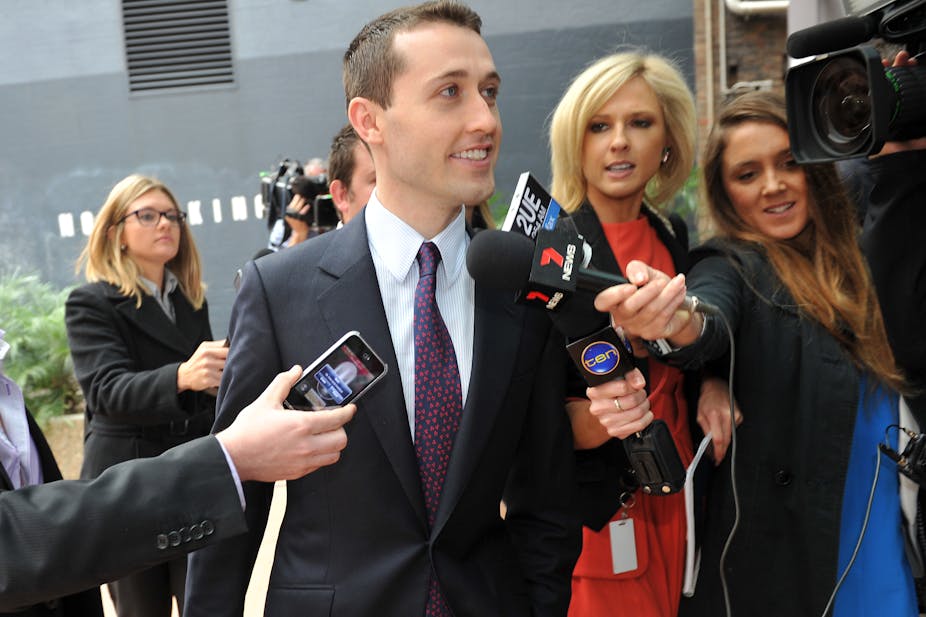Last night, ABC’s Four Corners investigated Tom Waterhouse’s heavily marketed entrance to the online Australian sports wagering industry.
Along the way it showed the ways in which the gambling industry has insinuated itself into the Australian media, and posed several questions of public importance.
Is there such a thing as rampant promotion in a media age?
Jeff Kennett, former Victorian premier and ex-president of AFL club Hawthorn, said saturation of televised sport by gambling sponsorship was sending a message that “not only is it alright to bet but you’re a mug if you don’t”.
This captures a broader shift towards media interactivity. We can now vote for contestants of reality shows; we can call for a chance to win the $1,000 cash give away on morning television; and we can tweet to “join in the conversation” with Q&A panellists.
Gambling becomes one more form of media interactivity - an exciting way to participate in live screen spectacles watched by millions worldwide. Through the interactive technology of computers, tablets and mobile phones, online gaming consumers bet on other kinds of events from elections to global stockmarket movements.
This is good for business, but how does it affect the cultural values we attach to sport as participants and spectators? As gambling shifts from a subcultural practice and occasional leisure activity to become part of everyday media consumption patterns, it becomes a significant way of defining our identities:
What kind of gambling products do I prefer? What is my gambling style? Am I content to pick a winner or am I someone who prefers more “exotic” choices?
Should we be concerned about the exposure of children to gambling through televised sports?
This question highlights one of the most emotive issues raised by the TV ubiquity of Tom Waterhouse. It has prompted the Greens to develop federal legislation preventing gambling advertising during children’s viewing times.
Waterhouse stands out from other online gambling operators as a savvy negotiator of celebrity culture. His television advertisements literally place him alongside the legends of the sporting stadium, but as a member of a parallel breed: the celebrity bookmaker. He boasts his pedigree:
I was born a Waterhouse. I was born to bet.
Embodying his brand with a fixed smile capable of surviving the most ferocious journalist scrum, Waterhouse invites audience identification in ways that Olympian sporting figures cannot. We can all bet, right? Certainly, Waterhouse’s controversial appearances as panel “participant” and field “commentator” on Channel 9’s rugby league coverage convey to young audiences that betting is a valued mode of participation in sport.
Yet refreshingly absent from Waterhouse’s “mummy’s boy” advertising persona is the “boys will be boys” theme monotonously pursued by his competitors, where women seem to exist for the sole purpose of applauding the punting expertise of very tipsy young men.
Can corruption be avoided when professional sport is bankrolled by gambling industries?
Sports journalist Peter FitzSimons characterised the penetration of gambling into live televised sports as nothing less than a “corruption of the soul of sport”. This was echoed in interviews with other public figures worried about conflicts of interest when sporting, media and gambling industries converge.
It may be legal for someone to hold a trainers’ license and someone to hold a bookmakers’ license in the same family, and for jockeys and other sportsmen to frequent brothels owned by major punters. But this doesn’t make these scenarios conducive to ethical sportsmanship.
When the sums of money generated by live televised sport are so enormous that club officials and individual players have allegedly turned to performance enhancing drugs to stay at the top of their game, perhaps the very soul of sport is in danger. What happens to the integrity of sport when a fumbled ball or a missed goal can provide a player on the low-to-middle range of salary with an income stream commensurate with his team’s stars?
How well is the self-regulation of gambling industries serving punters and audiences?
When pokies first arrived in suburban pubs in the 1990s they attracted relatively little notice. It took over a decade for the public health issues involved in their consumption to become widely visible and taken up in parliament by advocates such as by Nick Xenophon and Andrew Wilkie.
Will the incursion of wagering sponsorship and odds announcements into live televised sport precipitate similar problems for a generation yet to come of gambling age?
Or has this horse already bolted?

